-
Afraid, yet filled with joy
 Mixed emotions. We are full of them. We cry tears of sorrow and joy, in the same moment. The things that make us most excited also make us the most nervous—just ask a new parent. Yesterday, I felt relieved and sad at the same time. Our mixed emotions may seem illogical, but they are very real manifestations of all that is going on in our minds and hearts.
Mixed emotions. We are full of them. We cry tears of sorrow and joy, in the same moment. The things that make us most excited also make us the most nervous—just ask a new parent. Yesterday, I felt relieved and sad at the same time. Our mixed emotions may seem illogical, but they are very real manifestations of all that is going on in our minds and hearts.
And spiritually speaking, many of our emotions and reactions do not make sense to the world. We rejoice when faced with trials, praise meekness, and consider blessed those who are poor in spirit.
As Christians, we even celebrate death! You know why? Because we see the power of the resurrection. The resurrection turned everything upside down.
After the resurrection, the mourning of the disciples was turned to gladness and their sorrow was turned to joy.
And, when the women approached the tomb and learned from the angel that Jesus had risen, we see that they were “afraid, yet filled with joy.”
What do you think made them feel afraid? Was their joy made complete because of their fear? Have you ever felt afraid, yet filled with joy?The angel said to the women, “Do not be afraid, for I know that you are looking for Jesus, who was crucified. He is not here; he has risen, just as he said. Come and see the place where he lay. Then go quickly and tell his disciples: ‘He has risen from the dead and is going ahead of you into Galilee. There you will see him.’ Now I have told you.”
So the women hurried away from the tomb, afraid yet filled with joy, and ran to tell his disciples. Suddenly Jesus met them. “Greetings,” he said. They came to him, clasped his feet and worshiped him. ~ Matthew 28:5-9So, today I ask, what do you fear? How does the resurrection bring joy to your fears? And how does the resurrection transform our reaction to all things?
-
An Unexpected King
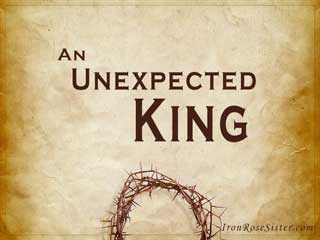 There is a joke we often refer to in my family about two people, who were outside enjoying a cool, clear evening. One comments to the other about the beauty of God’s creation and the music they can enjoy as they rock in their rocking chairs. The other responds, “Yes, such amazing music. I wonder how they do it.”
There is a joke we often refer to in my family about two people, who were outside enjoying a cool, clear evening. One comments to the other about the beauty of God’s creation and the music they can enjoy as they rock in their rocking chairs. The other responds, “Yes, such amazing music. I wonder how they do it.”
“I believe they do it by rubbing their legs together.”
“What?! The choir up the road at the little church makes fine music by rubbing their legs together?!”
“No, silly. I was talking about the nightly music of the crickets.”
It is so easy to think we know what we are talking about. And when the Jews repeated the prophecies about Jesus with hope and anticipation, they expected a great political king that would free them from Roman bondage. -
And the Curtain was Torn!
Written by Deanna Brooks, volunteer with Iron Rose Sister Ministries in Arkansas

When we read through Scriptures, we see God has pursued a relationship with man from the beginning. He walked with Adam and Eve; He called Abraham to follow Him; Moses was chosen by God to lead the Hebrews from Egypt and become His people in the Land of Promise.
The Old Covenant was given through Moses; the New Covenant came through Jesus Christ (John 1:17).
Under the Old Covenantthey had:
- A set of laws written in stone where God outlines acceptable behavior and sinful behavior.
- An earthly high priest through the line of Aaron, who had to offer a sacrifice for his own sin first (Heb. 5:1-4) … and these sacrifices were repeated over and over with communication through priests and prophets.
- Rituals of purity and cleansing; sacrifices were offered for illness, childbirth, and sin. There were times of required fasting. The Sabbath was to be holy and a day of rest. Men went to Jerusalem three times a year.
- ONLY the High Priest was allowed in the Most Holy Place where the Ark of the Covenant was and where God came down to receive the sacrifice.
For centuries a curtain hid the area where the high priest entered once a year to make sacrifices for sin (Lev. 16), where God came down and hovered above the mercy seat to receive the sacrifice. The people never entered into this holy area.
But one Passover when the priests were offering the sacrifice of the lambs for the sins of the people, the thick, heavy curtain of the temple was torn from top to bottom. It was torn in two because another lamb was being sacrificed not too far away on the hill of Mount Calvary, and that lamb was Jesus—the perfect lamb—the perfect sacrifice which was being offered for all men for all time. Because of this sacrifice, Jehovah God proclaimed Jesus both Lord and Christ (Acts 2:36).
And behold, the curtain of the temple was torn in two, from top to bottom. And the earth shook, and the rocks were split. (Matt. 27:51 ESV)
This 30-foot-tall curtain was ripped from top to bottom, as though the hands of God reached down and tore it open, inviting you and me to have direct access to Him. Because the curtain was torn, we have direct access to the Throne of Heaven!
Because of that perfect sacrifice, our purification is through the blood of Jesus Christ which cleanses us as we are baptized into Him. Jesus' sacrifice was one time for all men. Our baptism is a one-time event that washes us clean. Our life of faithfulness and confession keeps us clean.
Under the New Covenant we have:
- Laws written on the heart (Heb. 10:16).
- A sinless Heavenly Priest (Heb. 9:24, 28, 10:12) who offered one sacrifice.
- The opportunity to meet with other disciples on the first day of the week to share the Lord’s Supper and worship our Heavenly Father.
- Adoption by God (Gal. 4:5). When we become followers of Jesus, the Hebrew writer says, “For he who sanctifies and those who are sanctified all have one source. That is why he is not ashamed to call them brothers” (Heb. 2:11).
- Jesus Christ, our Messiah as our sacrifice … not a bull or goat, as we read in Hebrews 10:10-12.
…we have been sanctified through the offering of the body of Jesus Christ once for all. And every priest stands daily at his service, offering repeatedly the same sacrifices, which can never take away sins. But when Christ had offered for all time a single sacrifice for sins, he sat down at the right hand of God.
In verses 19-23, Hebrews 10 goes on to say that because Jesus is our sacrifice, one sacrifice for all of us, we have access to our Heavenly Father through Him.
Therefore, brothers, since we have confidence to enter the holy places by the blood of Jesus, by the new and living way that he opened for us through the curtain, that is, through his flesh, and since we have a great priest over the house of God, let us draw near with a true heart in full assurance of faith, with our hearts sprinkled clean from an evil conscience and our bodies washed with pure water. Let us hold fast the confession of our hope without wavering, for he who promised is faithful.
In 1742, Charles Wesley wrote a hymn that contains these words: “With confidence I now draw nigh and ‘Father, Abba Father’ cry!” Those who lived before us under the Old Covenant could not have sung those words.
So, the important question for us is: Do we take advantage of our access to the Throne of Heaven as children and heirs of the Heavenly King?
-
Betrayal in Relationships: Jesus and Judas vs. Peter
Written by Marbella Parra, volunteer with Iron Rose Sister Ministries in Honduras

God created us as social beings with a need to relate to other people. We mostly enjoy sharing special moments of our lives with others. In the journey of our life, we meet people—and some of them stay with us. We develop friendships, and we support each other in happy moments as well as in difficult times. We call these people friends.
Proverbs 17:17 says, “A friend loves at all times, and a brother is born for a time of adversity” (NIV). On this path of relationships, situations can arise in which we are disloyal to that person who has trusted us. Yes, we are talking about betrayal—a pretty strong word, but real. I don’t think that anyone would like to be called traitorous, but the truth is that at some point in our lives we have failed in our relationships, and others have also failed us.
The Bible recounts two quite shocking cases of betrayal that cause us to reflect on our own relationships; they are Judas and Peter, two disciples who had the joy of sharing a close relationship with Jesus. They saw His miracles, walked with Him, ate at the same table, learned from His teachings, and accompanied Him in His ministry. They had a beautiful privilege—to be friends of Jesus. Similarly, we have people who share with us, know us, eat with us, go out with us, and laugh and cry with us. But relationships are always put to the test, and Jesus' relationships with Peter and Judas were no exception.
Let's first talk about Judas. In the gospels, we find few details about Judas, but it is known that he was a follower of Jesus and supported His ministry. It is also known that he had a soft spot for money; so much so that his greed led him to betray Jesus for 30 pieces of silver. Judas faced a very tempting opportunity that made him fall and lose the trust and friendship that Jesus had with him. Tragically, after falling and thinking about what he had done, he did not know how to handle the situation and ended his own life.
Then there is Peter, about whom we have more details in the Bible. He had an energetic and impulsive personality, and something that stands out about him is that he recognized Jesus as the Son of God, always ready to serve and work alongside Him. Peter was strongly involved in Jesus' ministry, but, like Judas, he underwent a test of faithfulness. Although in many moments he expressed his faith and love for Jesus, in a difficult moment when he had to express his beliefs and show loyalty to his Lord, he did not measure up and betrayed Him.
Likewise, our relationships go through moments of testing, and often we betray some. Perhaps we speak ill of our friends to others, turn our backs on them in difficult times, envy their achievements, and damage our long-standing relationships in many other ways. At other times, we are betrayed by others. But this is not the end of the story. As humans, we will fail, but the final test is how we behave after betraying others, including God, and also how we behave when others betray us.
We have 3 examples from which we can learn. The first two show us the importance of repentance when we are the ones who betray someone. Judas teaches us that we can take the “easy path”; he believed that he would solve everything by ending his life, but it would have been better to repent and genuinely change. We can take the easy road, pulling away from that special person, not talking to them anymore, and if we have failed, showing them an attitude of pride, and withdrawing without fighting for that friendship. Peter on the other hand, after making the big mistake of denying Jesus, had great pain in his heart and repented. After his betrayal, he changed his life, asked for forgiveness, and continued to serve his Lord faithfully until his death. Asking for forgiveness is the difficult path; many times it is hard for us to admit that we have failed and reach out to that person, perhaps out of shame, or perhaps out of pride, but in the end, fixing things with that special person that we have offended can redeem an important relationship in our lives.
And last but not least, we have Jesus, an example to meditate on when we are the objects of betrayal. He was a faithful friend who was always willing to forgive. Despite the failures of Judas and Peter, I am sure that He was willing to receive them again and give them another chance. Peter took advantage of this blessing and further strengthened his ties with Jesus; unfortunately, Judas did not. In Jesus, we have a great example of forgiveness when someone special betrays us. Although it hurts to be betrayed and produces enormous sadness, it is worth forgiving and rescuing those relationships that God has placed in our path.
Let us learn from the example of our Lord Jesus who was willing to forgive betrayal, and from Peter who was willing to admit his mistake and change completely for the good of his relationship with our Lord.
I want to invite you today to value all those special relationships that you have or have had. Is there any relationship that you can recover today through repentance or forgiveness?
-
Both Lion and Lamb
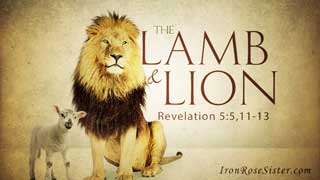 The Lion of Judah and the Lamb who was slain.
The Lion of Judah and the Lamb who was slain.
Strength and humility.
Power and vulnerability.
Majesty and sacrifice.
Jesus Christ, Messiah, Redeemer, Emmanuel, is compared with both a lion and a lamb in Revelation 5:5-6.
5 Then one of the elders said to me, “Do not weep! See, the Lion of the tribe of Judah, the Root of David, has triumphed. He is able to open the scroll and its seven seals.”
6 Then I saw a Lamb, looking as if it had been slain, standing at the center of the throne, encircled by the four living creatures and the elders...
Thanks be to God for sending His Son as Lion and Lamb—fulfilling the prophecy and allowing for us to be united with Him through the sacrifice. -
Can’t help but share the good news!
 Have you ever witnessed something that you couldn’t stop talking about—something that was so exciting, such a blessing, that you couldn’t help but tell others?
Have you ever witnessed something that you couldn’t stop talking about—something that was so exciting, such a blessing, that you couldn’t help but tell others?
The disciples did. But they didn’t care how others reacted to the thrilling news. The power of the resurrection compels us to share the good news of hope that can only come through Christ. Peter and John stated it clearly when they were persecuted for healing a lame man and speaking of the resurrection.As for us, we cannot help speaking about what we have seen and heard (Acts 4:20).
They couldn’t shut up about it. The news was too good, too transforming to keep silent. And it wasn’t about those men, but rather it was about the news they shared and about the One with whom they had spent their time.
Which is why I have come to love and appreciate an earlier verse from the account in Acts 4... Verse 13 says, “When they saw the courage of Peter and John and realized that they were unschooled, ordinary men, they were astonished and they took note that these men had been with Jesus.”My challenge for you today:
Can others tell when you have been with Jesus?Are you so filled with the hope and love of the good news of the resurrection that you can’t help but share that with others?
Additional note by Katie Forbess:
Jesus doesn’t ask us to stay at the tomb and simply wonder at the resurrection. He asks us to share the gospel. There are so many ways for us to do this. There are Bible classes to be taught, cards to be written, correspondence courses to be graded, jails to be visited, small congregations to be encouraged, and nursing homes to be sung at.
If the transforming power of Jesus has touched our lives we should be touching others lives with the good news of the gospel! Yet the most direct way to share the gospel is by telling our own stories. Not our resume of where we work and what we do for God but what he continually does for us. Saves us. Holds us. Rejoices over us. -
Christ is Our Head
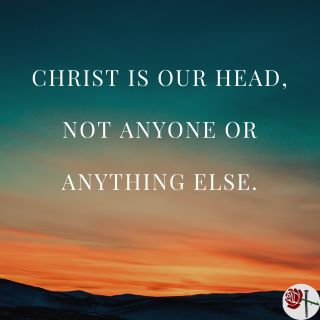 Written by Kara Benson, volunteer with Iron Rose Sister Ministries in Little Rock, AR
Written by Kara Benson, volunteer with Iron Rose Sister Ministries in Little Rock, AR“He is the image of the invisible God, the firstborn over all creation. For by him all things were created; things in heaven and on earth, visible and invisible, whether thrones or powers or rulers or authorities; all things were created by him and for him. He is before all things, and in him all things hold together. And he is the head of the body, the church; he is the beginning and the firstborn from among the dead, so that in everything he might have the supremacy.” (Col. 1:15-18)
Wow! If you skimmed or skipped the first paragraph, I encourage you to go back and reread it. These are meditation-worthy verses proclaiming the power and preeminence of Christ! From time to time, I need to be reminded that Christ is our head.
Christ is our head, not people. Often, we are guilty of putting people on a pedestal. They are inspiring teachers, great examples, and we naturally look up to them. However, esteeming someone too highly can be destructive to our faith if they fall. What happens when your beloved preacher, wonderful worship leader, or esteemed elder falls away? Would you feel lost without him and begin to question your own convictions? Or would your faith in Christ remain vibrant?
Jesus is our high priest; no one else can stand between us and God (Heb. 4:14-15). First Timothy 2:5 says, “For there is one God and one mediator between God and men, the man Christ Jesus.” We should not let the opinions and decisions of others affect our relationship with God. If we trust in mankind, then we will be repeatedly disappointed. But “blessed is the man who trusts in the Lord, whose confidence is in Him” (Jer. 17:7). People will inevitably let us down, but God will remain a strong tower for the righteous.
Christ is our head, not culture. Let me be the first to say that culture is beautiful. Learning about the customs, foods, holidays, music, and languages of the world is fascinating to me. I fell in love with the Spanish language and studied it in school for nine years. Revelation 7 describes my favorite scene in the Bible: people from every nation, tribe, and language standing before the throne, robed in white, and worshipping our God. I am so excited to see that day!
We can certainly celebrate our culture and be proud of our heritage. But every culture is flawed because it is cultivated by flawed, broken people. There are parts of every culture that are sinful and need to be redeemed. In Romans 10:2-3, Paul writes that the people sought to establish their own righteousness instead of having their righteousness based on God. Cultures will vary and shift throughout the years, changing with each new generation. However, Jesus Christ is the same yesterday, today and forever (Heb. 13:8). Paul was willing to lay aside his cultural background when necessary for a higher calling, specifically winning the lost (1 Cor. 9:19-23). Following Jesus and His Word takes precedence over everything. Our allegiance is to Christ and the kingdom of God before any earthly kingdom, nation, or culture.
Christ is our head, not my emotions. Anxiety, anger, bitterness, loneliness, romantic passions, pride... if I am not careful, my emotions can run the show and run away with me. They may cause me to reinterpret scripture to fit what I want or justify poor choices. I may strongly feel a certain way, but the heart is deceptive above all else (Jer. 17:9). Emotions cloud our vision, which is why we must take every thought captive and make it obedient to Christ (2 Cor. 10:5).
The body only moves where it is directed by the head. When a part of our body does not obey our mind, often there is pain and dysfunction. Likewise, when we follow people, culture, or emotions, there will be disunity and conflict in the body of Christ. Let us remember that Christ is our head. As Christians, we take our direction and priorities from Him and His Word.
His love and mercy, His sacrifice and self-denial, His obedience and desire to please the Father are our example. Christ has lordship over the church and over our lives. And His authority is good and glorious because He is our Savior who bought us back with His precious blood! Joyfully, we submit to Him!
“[God] has spoken to us by his Son, whom he appointed heir of all things, and through whom he made the universe. The Son is the radiance of God’s glory and the exact representation of his being, sustaining all things by his powerful word. After he had provided purification for sins, he sat down at the right hand of the Majesty in heaven. So he became as much superior to the angels as the name he has inherited is superior to theirs.” (Heb. 1:2b-4)
-
Christ’s Example
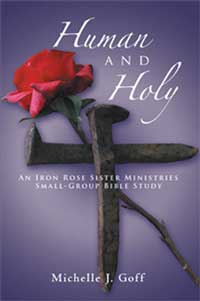 “For to this you have been called, because Christ also suffered for you, leaving you an example, so that you might follow in his steps” (1 Peter 2:21).
“For to this you have been called, because Christ also suffered for you, leaving you an example, so that you might follow in his steps” (1 Peter 2:21).
What a tough act to follow!
Have you ever seen a little boy on the beach, walking with his dad and leaping to make his footprints match with his father’s? That’s how I feel sometimes when I try to follow Christ’s example—like my legs are too short, my efforts too small. I feel like I can never measure up... I go from one extreme to another: determined to never make a single misstep and beat myself up for my failures or give up and decide it’s not worth the struggle. It’s an exhausting pendulum. And I was weary—beaten down by life and my own unrealistic expectations.
The trap of perfectionism had a firm hold on my life until I crumbled under the pressure of that trick of Satan. I believed that I was called to be perfect in every way: holy and beyond reproach—that to be human and express the overwhelming and natural emotions that we face was a sign of weakness and sin.
My misunderstanding of Romans 8 and the condemnation of the flesh actually had me condemning Christ, who came in the flesh. -
Confession
 Written by Deanna Brooks, volunteer with Iron Rose Sister Ministries in Arkansas
Written by Deanna Brooks, volunteer with Iron Rose Sister Ministries in Arkansas“I believe Jesus is the Christ, the promised Messiah, the Son of the Living God.”
We make that confession or something similar before we are immersed for remission of sins, and we come out of the water to live a new life, filled with the Holy Spirit according to Acts 2:38 and Romans 6:4.
In confessing Jesus as the Christ, we are yielding our lives to His control where He is the ultimate Power and Authority in our lives. We have turned our lives over to Jesus, knowing He is walking with us as we face the ups and downs of life.
In 1 Corinthians 6:19-20 (ESV) Paul wrote, “…your body is a temple of the Holy Spirit within you, whom you have from God? You are not your own, for you were bought with a price. So, glorify God in your body.”
When we choose to confess Jesus, it means we reevaluate what success means. It means we have a different way of thinking about life. We no longer make decisions based on our wants. Our decisions reflect our Savior. We speak and act differently from the world.
Paul tells us in Colossians 3:1-5: “If then you have been raised with Christ, seek the things that are above, where Christ is, seated at the right hand of God. Set your minds on things that are above, not on things that are on earth. For you have died, and your life is hidden with Christ in God. When Christ who is your life appears, then you also will appear with him in glory.”
Think about that…Christ is our life, and we will appear with Him in glory!
Because of this confession, people leave the life of sin dominated by Satan. Thieves no longer steal; the immoral change the way they view others and pursue a life of purity; the liar seeks to speak truth, and all who confess will see the Almighty as HOLY, HOLY, HOLY… all because they have turned their life over to Jesus the Christ. We remember John’s words, “He that is in you is greater than he that is in the world,” (1 John 4:4 ESV) as we face the ups and downs of life.
Life happens, and even though WE are changed, circumstances around us may not be changed, and that sometimes creates problems as we try to walk with Jesus. Satan continues to roam the earth, looking for our weaknesses, seeking whom he may devour (1 Pet. 5:8.)
This confession is something we renew daily… we continue to confess Jesus is the Christ by the life we live… in little things that are part of everyday life… as well as bigger things that have long-term consequences.
When I’m struggling, it helps to think back to when I made that confession. Do you remember what was whirling through your mind? For me, I was a few months past my 12th birthday, and I remember a mixture of fear and joy. I realized I was making a lifetime decision, but I didn’t know what the future would hold for that decision or what kind of struggles I might face. The joy came from realizing I was a child of God, adopted by Him, and Jesus was my Brother (Heb. 2:11.)
This confession does not prevent sin from entering our lives, but the apostle John wrote, “But if anyone does sin, we have an advocate with the Father, Jesus Christ the righteous” (1 John 2:1).
Jesus tells us in John 14:6 that He is the Way, Truth, Life… and no one comes to the Father but by Him, and later in 1 John 4:15 we read, “Everyone who confesses that Jesus is the Son of God, God abides in him and he in God.”
The culture around us may change and see evil (sin) as good. Long ago Isaiah wrote, “Woe to those who call evil good and good evil” (5:20.) This is part of our struggle.
This confession leads to baptism for remission of sins which puts us into God’s family… we are children of the Creator… we have a Brother, our Advocate, to stand beside us.
The day is coming when “so that at the name of Jesus every knee should bow, in heaven and on earth and under the earth, and every tongue confess that Jesus Christ is Lord, to the glory of God the Father” (Phil. 2:10-11).
At that time, we will rejoice, because we have lived our lives confessing Jesus as the Christ!
#IronRoseSister #HIStories #confession #salvation #JesusisLord #yield #blog
-
Dark Days of the Soul
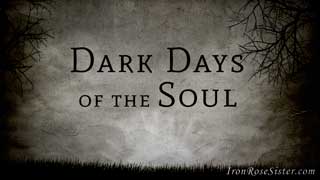 A friend once described a depressed time in her life as “dark days of the soul”—a picturesque explanation of the heavy weight that accompanied her.
A friend once described a depressed time in her life as “dark days of the soul”—a picturesque explanation of the heavy weight that accompanied her.
As we approach resurrection weekend, I am reminded of the heavy weight that accompanied our Lord on the night He was betrayed. He knew He was in a vulnerable place and asked His friends, Peter, James, and John, to accompany Him to the Garden of Gethsemane and in prayer. -
Dorcas' story and IRSM newsletter
 I want to tell you the story of someone who is in love with Jesus. Her name is Dorcas and I am not referring to the one in Acts, chapter 9.
I want to tell you the story of someone who is in love with Jesus. Her name is Dorcas and I am not referring to the one in Acts, chapter 9.
I met this Dorcas in Guatemala City. She was baptized a number of years ago, but became discouraged for various reasons, and even though she continued in her love for God, she had stopped going to church and her faith was weak.
However, during the past couple of months, every Monday morning, she studied the book In God’s Right Hand with Katie Lynn Finch, IRSM’s summer intern last year. Dorcas was so excited to share in this time of encouragement, study, and fellowship before opening her store.
Dorcas, just like the one in the book of Acts, is always around a lot of people. She doesn’t sew, but she sells clothes from her store every day. She never closes, not even on holidays. -
Even Jesus Got Battle-Weary
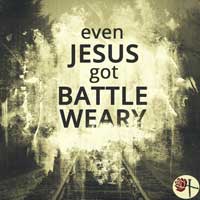 Weary. Tired. Beaten down. But never alone.
Weary. Tired. Beaten down. But never alone.Through the video series “Victorious and Joyful in Battle,” we acknowledged that everyone is facing a battle in their lives. Our battles may look different, but the struggles are the same. And in the midst of the battle, we get weary and forgetful. The struggles consume us because we are in survival mode and can lose sight of what we are fighting for.
The hope of victory may feel like a distant, even nonexistent reality. However, we can wait in hope and eager expectation of the victory we have in Christ!
This past weekend, we celebrated the victory of the resurrection—the ultimate victory over death. And if we have been united with Christ in His death and His burial, we are promised the victory of the resurrection (Rom. 6:1-4)!
Yet Jesus, in His humanity, even though He knew with absolute certainty the promise of the resurrection, He and His disciples became weary in the battle.
We do not have to feel guilty for feeling weary! And when we do feel beaten down and exhausted, Jesus reminds us of three keys during the weary stage of the battle, as we eagerly anticipate the victory of the resurrection.
Jesus’ example shows us that
1. It’s okay to admit our weariness. “Then he said to them, “My soul is overwhelmed with sorrow to the point of death... The spirit is willing, but the flesh is weak” (Matt. 26:38a, 41b).
2. It’s okay to ask for help. “...and he said to them, “Sit here while I go over there and pray.” He took Peter and the two sons of Zebedee along with him... Stay here and keep watch with me” (Matt. 26:36-38).
3. Prayer is vital for keeping our perspective. “So he left them and went away once more and prayed the third time, saying the same thing” (Matt. 26:44).I rejoice with you in the hope of the resurrection and the victory we share through Him.
-
Everybody has their own Jesus song
 It was a Wednesday night back in the late 90’s. We wore our baggy clothes to Dr. Sam and Dr. Cathie’s each week to sing, study the Word, and fellowship as a group of Harding students, grateful to be in a real home one evening a week.
It was a Wednesday night back in the late 90’s. We wore our baggy clothes to Dr. Sam and Dr. Cathie’s each week to sing, study the Word, and fellowship as a group of Harding students, grateful to be in a real home one evening a week.There were many occasions for sidesplitting laughter in the midst of Bible discussion. Yet the most infamous material, that has provided much laughter for many years since, was a Wednesday night in which only one of the guys showed up.
We girls begged and begged him to lead some songs for us, but he was hesitant as he himself admitted, “I can’t carry a tune in a bucket.”
“That doesn’t matter,” we responded enthusiastically. “Just start the song and we will all jump in immediately. All you have to do is start it.”
The gaggle of girls wore him down and he finally relented, having been assured that all he needed to do was start the song.
“Are y’all ready?”
A chorus of yeses was the quick response.
He took a deep breath and we all waited in anticipation as his deep monotone voice said, “Jesus,” immediately followed by, “You didn’t jump in!”
We stifled laughter as we exclaimed, “But you didn’t tell us which Jesus song!” Every single person in the room proceeded to list a different song that had first come to mind, asking if that was the one he had started.
But his moment of bravery had passed. After the “Jesus” episode, we were never to convince him to lead singing again for the Wednesday night Bible studies…
Nearly twenty years later, the memory of that night still brings tears to my eyes—tears of laughter at the hilarity of the moment, but also now, a tear of joy in recognizing the beauty found in each of us having a different Jesus song that came to mind.
What’s your Jesus song?
-
Falling in Love with Jesus
 If I were to ask you to make a list of things you do, say, and act like when you are in love, it might look something like this:
If I were to ask you to make a list of things you do, say, and act like when you are in love, it might look something like this:
• You’re happy
• You talk about him all the time
• He’s always on your mind
• You talk to him all the time
• You find out what makes him happy
• You spend time with him
• You show him off to your friends
• You quote him
• You make him a priority in your life
• You make plans for your future together
• People think you’re crazy
• You would do anything for him
• You start to act/think like him (Imitation is the sincerest form of flattery)
Does the same list apply if we are in love with Jesus? -
Falling in Love with Jesus in California
 Do you love Jesus with your head or your heart?
Do you love Jesus with your head or your heart?What does it look like to passionately love Jesus?
Who is that Jesus we thought we knew?
How can I live as a reflection of God’s love?
These and other questions will be answered this weekend in Escondido, California, at the North County Church of Christ. I will be speaking at the Ladies Retreat in English and Spanish, starting tonight.
Please keep me and these ladies in your prayers as we explore what it means to be Falling in Love with Jesus.
-
Four perspectives on Jesus
 Matthew wrote to the Jews about Jesus, Messiah—the fulfillment of the prophecies and the one who established the kingdom.
Matthew wrote to the Jews about Jesus, Messiah—the fulfillment of the prophecies and the one who established the kingdom.Mark gave an action-packed account of how the people were amazed at all Jesus did.
Luke chose a more Gentile audience who was not familiar with the Jewish traditions and longed to hear other details of his time on earth highlighted.
John focused more on who Jesus is and all he represents as the great I AM, the Word that became flesh and dwelt among us.
Each of the four gospels provides unique insight into Jesus and his time on this earth.At different times in my life, one or another of those perspectives have spoken to me more than another.
A small group Bible study member recently compared the gospels to four different puzzles. They each display a different picture and if you try to fit the pieces of one puzzle into the frame of another, it doesn’t work.
John presents a more thematic than chronological approach, for example. And since Luke is speaking to the Gentiles and Matthew to the Jews, their views on different events are seen from distinct directions.
What a blessing that we have these four accounts of our Savior’s time on earth! The story of Christ would be incomplete if we didn’t have these four perspectives.
I have committed to reading all four gospels this month in honor of this month’s theme. Which of the four gospels will you read with us this month?
-
Four perspectives on Jesus
 Matthew wrote to the Jews about Jesus, Messiah—the fulfillment of the prophecies and the one who established the kingdom.
Matthew wrote to the Jews about Jesus, Messiah—the fulfillment of the prophecies and the one who established the kingdom.
Mark gave an action-packed account of how the people were amazed at all Jesus did.
Luke chose a more Gentile audience who was not familiar with the Jewish traditions and longed to hear other details highlighted during Jesus’ time on earth.
John focused more on who Jesus is and all He represents as the great I AM, the Word that became flesh and dwelt among us.
Each of the four gospels provides unique insight into Jesus and His time in the flesh, when He dwelt among us. At different times in my life, one or another of those perspectives have spoken to me more than another.
A small group Bible study member recently compared the gospels to four different puzzles. They each display a different picture and if you try to fit the pieces of one puzzle into the frame of another, it doesn’t work.
John presents a more thematic than chronological approach, for example. And since Luke is speaking to the Gentiles and Matthew to the Jews, their views on different events are seen from distinct directions.
What a blessing that we have these four accounts of our Savior’s time on earth! The story of Christ would be incomplete if we didn’t have these four perspectives.
I have committed to reading all four gospels this month in honor of this month’s theme. Which of the four gospels will you read with us this month? -
His Humility
 He who knew no sin became sin so that we might become the righteousness of God (1 Cor. 5:21).
He who knew no sin became sin so that we might become the righteousness of God (1 Cor. 5:21).
God became flesh and dwelt among us (John 1:14), becoming the perfect sacrifice (Heb. 10:10-14) that we might be forgiven of our sins, and have a perfect mediator between God and us (1 Tim. 2:5).
Jesus did not consider equality with God something to be valued more than His purpose as the perfect sacrifice (Phil. 2:3-8). Do we have a better example of humility?
We cannot reject our equality with God, as Jesus did, because it was never ours to claim. How do we show humility? -
His Time was Not His Own
 Jesus knew His life was but a vapor—a mist that appears for a little while and then vanishes (James 4:14). Yet He made the most of every opportunity (Eph. 5:16) and remembered His purpose while on earth. His time was not his own. He was merely a steward of what God had given Him.
Jesus knew His life was but a vapor—a mist that appears for a little while and then vanishes (James 4:14). Yet He made the most of every opportunity (Eph. 5:16) and remembered His purpose while on earth. His time was not his own. He was merely a steward of what God had given Him.
What is a steward? The steward is not the owner, but he represents the owner—in caring for the owner’s possessions, speaking for him, serving him, etc.
Each of you should use whatever gift you have received to serve others, as faithful stewards of God’s grace in its various forms. If anyone speaks, they should do so as one who speaks the very words of God. If anyone serves, they should do so with the strength God provides, so that in all things God may be praised through Jesus Christ. To him be the glory and the power for ever and ever. Amen. (1 Pet. 4:10-11) -
How Jesus Taught Me to Pray
Written by Katie Forbess, President of the Board of Directors of Iron Rose Sister Ministries, with the collaboration of Jubilee Forbess, her daughter

I finally made it to my closet. I have wanted for years to create a place of prayer there. I have always felt the need, but it never happened until I was invited to spend 29 days in quiet prayer, for Advent 2022. I realized that shutting everything else out is so important because it makes you focus on the presence of God. By repeating, “reveal yourself to me,” I was strengthened in remembering that prayer is where you are alone, but with the Creator God. So, through growing up in the church and trusting God through many trying times, I have found the following lessons and am eager to share them. I wrote pages and pages of anecdotes narrating this story, but, like prayer, this doesn’t need to be so complicated.
The only way you can truly learn to pray is by doing it. Jesus told the disciples,
“When you pray,say: "`Father, hallowed be your name, your kingdom come. Give us each day our daily bread. Forgive us our sins, for we also forgive everyone who sins against us. And lead us not into temptation”(Luke 11:2-4)
Why? They were Jewish men who already prayed. They just needed a little tweaking, because… The Messiah was among them. They needed a little perspective. They needed a reminder of what they should ask for, what they should not ask for, and how forgiving others was the key to being forgiven. Prayer is a command.
My prayer life is what it is because of all the prayers and sermons and songs and books that have come before today. I reflected upon a short story, “Eleven,” that speaks of being all the ages and realized that my prayer life is all the teachings, plus the decision to engage daily. The Scripture. The songs. The answered prayers of 45 years. These were my teachers and my foundation, the pure material that has come through in life’s many trials. Prayer is like breathing.
Jeff lost his wallet. We prayed as we left to run errands. He found it while we were gone. Prayer is simple.
God is faithful when we take one step towards Him. I also believe that the verse in 2 Corinthians 12:10, “When I am weak, then I am strong,” is now etched on my heart. When we returned to the United States from Bolivia, I cried every Sunday during the singing. With emotions and transformation that I can’t explain well in words—works of the Spirit, I am sure—I poured out my soul to God in prayer. I chose not to wipe the tears away. Prayer is hard.
There was a time when I was driving every day after work to take college classes in Greeley, Colorado. On my way there, I was listening to rock music and reading the NY Times. It was a time that would end in a miscarriage, but before that, I realized that I needed to use my time differently and started to listen to purely KLOVE (Christian radio). The same thing seemed to happen in November of 2022. Things were so hard and I needed to be in constant prayer. Fire refines us and shows us who we really are. Sometimes it only warms me, other times it lights the way. Sometimes it burns me, and other times it sweats the impurities out of me. Prayer, then, is like fire.
I had to pray for the enemy. Keep quiet and let God fight for us. I had to reach out and contact the prayer warriors and ask them to pray for something I simply couldn’t talk about. I had to give thanks, because there was no doubt that the hand of God was in even this terrible situation. I had to trust that God would shut the mouths of lions and He seemed to surround me with lambs. Prayer is a gift.Looking through your life and the lessons that Jesus has taught you about prayer, which ones surprise you the most during a time of crisis?
Page 1 of 2

